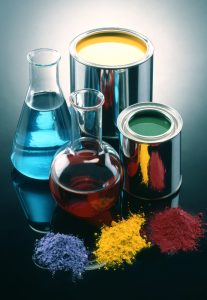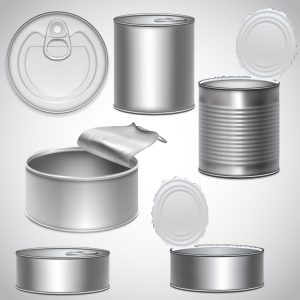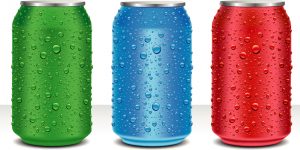 Phenolic resins are used in a wide variety of applications, including many types of high-performance coatings. These coatings are based on organic binders (synthetic resins), which when applied to a substrate produces a cohesive, virtually water-impermeable, protective and possibly decorative film.
Phenolic resins are used in a wide variety of applications, including many types of high-performance coatings. These coatings are based on organic binders (synthetic resins), which when applied to a substrate produces a cohesive, virtually water-impermeable, protective and possibly decorative film.
The coating formulation typically consists of resins, pigments, solvents, and additives.
By far the most important use of phenolic resol resins in the coating sector is in the crosslinking of hydroxy-functional film formers. This involves two parallel processes: external crosslinking between the resol and hydroxyl resin (polyol) and self-crosslinking of the resol.
Crosslinking is achieved either by heating at around 180°C, or by the presence of an acid catalyst at room temperature.
 On their own phenolic resins films are too brittle to be of any commercial use in surface coating systems. However, in combination with other resins like alkyds, epoxy resins etc., they form excellent surface coatings giving high adhesion and good chemical resistance.
On their own phenolic resins films are too brittle to be of any commercial use in surface coating systems. However, in combination with other resins like alkyds, epoxy resins etc., they form excellent surface coatings giving high adhesion and good chemical resistance.
Their main application is found in chemically resistant protective coatings and primers.
Example includes:
- Blends with epoxy resins (“gold coatings”) as flexible can linings
- Blends with polyvinyl butyral in “wash primers” (primer coats for metals)
- Blends with polyvinyl formal in electrical insulating or wire coatings
- Blends with flexible polyhydroxy resins (polyesters, short oil alkyds, acrylic resins, etc.) in chemically resistant primers
The colour and colour retention of coatings containing phenolic resins is usually poor and so precludes their use in topcoat systems. However, they are widely used as primers and undercoat systems, and phenolic modified oil soluble resins are of great importance in printing ink systems. Automotive primers are an important application area for epoxy phenolic coatings.
Epoxy phenolic coatings offer excellent corrosion resistance, sulphur staining resistance and are used extensively as interior and exterior coatings for drums and coatings for food cans. These coatings are chemically resistant and can be used in low pH and higher temperature environments.
 Modified phenolic resins are also used in antifouling marine paints in combination with chlorinated rubber coating systems. Oil or alkyd resins modified with 25-100% of resole or novolac resins form the basis of anti-corrosive undercoats for both sea and land transport.
Modified phenolic resins are also used in antifouling marine paints in combination with chlorinated rubber coating systems. Oil or alkyd resins modified with 25-100% of resole or novolac resins form the basis of anti-corrosive undercoats for both sea and land transport.
Phenolic resins can be made oil soluble by incorporation into alkyd and rosin ester resins. Modified phenolic resoles of this type are particularly important as binders for gravure and offset printing inks.
Phenolic coatings offer consistent high quality corrosion protection across a wide range of applications.
Epoxy phenolic coating is chemical resistant and typically used where low pH environments and higher temperatures are factors.
